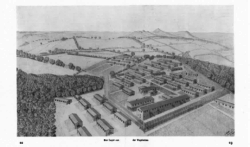The Armistice in Skipton Camp
At the time of the Armistice Britain held approximately 90,000 German prisoners of war in the UK. For these men the Armistice brought fear and anxiety; they were worried about what the future held for them, their families and for their homeland. They describe their feelings in Kriegsgefangen in Skipton:
Als am Vormittag des 11. November, des Waffenstillstandtages, von drauβen vor dem Lagertor der laute Jubel der englischen Wachmannschaften über den Stacheldraht klang und überall an den englischen Wohnbaracken die bunten Fähnchen im Winde flatterten, da stand der Schmerz und das Leid mit fast fremdartige Härte in unserer deutschen Seele auf. Man sah ernste, starke Männer wie Kinder weinen. Viele, die noch vor Tagen das Für und Wider so beredt erörtert hatten, wurden finster und wortkarg; andere brachen in leidenschaftliche Verwünschungen oder Klagen aus. Schatten fielen von diesem Tage an über unser Gefangenenleben; sie blieben und verstärkten sich noch unter dem quälenden Druck der folgenden Ereignisse. [...]
Wie schwer die Gemüter getroffen waren, zeigte sich erst deutlich, als sich die Wogen der äuβeren Unruhe geglättet hatten. Jede Gedanke in uns rang nach dem Begreifen und Deuten der neuen Lage. Das wunde Gefühl griff nach allen möglichen Hoffnungen. Man drängte sich an die Kameraden, man suchte Trotz und Stütze bei den Starken; die Leidenschaftlichen kämpften gegen die Matten, die Optimisten gegen die Pessimisten. Aber überall klang durch die Erregung dieser Zeit die heiβe, tiefverletzte Vaterlandsliebe hindurch.
Kriegsgefangen in Skipton pages 123-124
On the morning of the 11th November, the day of the ceasefire, as the noisy jubilation of the English guards rang over the barbed wire from outside the gates of the camp and colourful bunting fluttered in the wind all over the English barracks, pain and grief arose in our German souls with an almost unimaginable intensity. Solemn, strong men could be seen weeping like children. Many, who just days before had so eloquently debated whether Germany might still have a chance of victory, became gloomy and reticent; others had passionate outbursts of vitriol or lament. From that day forward, a shadow descended upon our lives in captivity; it stayed and intensified under the torturous strain of the events that followed. [...]
The enormity of the burden that weighed on our minds only became truly clear when the waves of upheaval had calmed down. Every thought within us strained to realise and comprehend the new circumstances. This gnawing feeling grasped at hope wherever possible. Every man sought the company of his comrades, seeking consolation and support from the strong; the passionate struggled against the weary, the optimists against the pessimists. But everywhere, through the chaos of these times, our fervent, gravely wounded love of the Fatherland resounded.
Translation: David Booth

